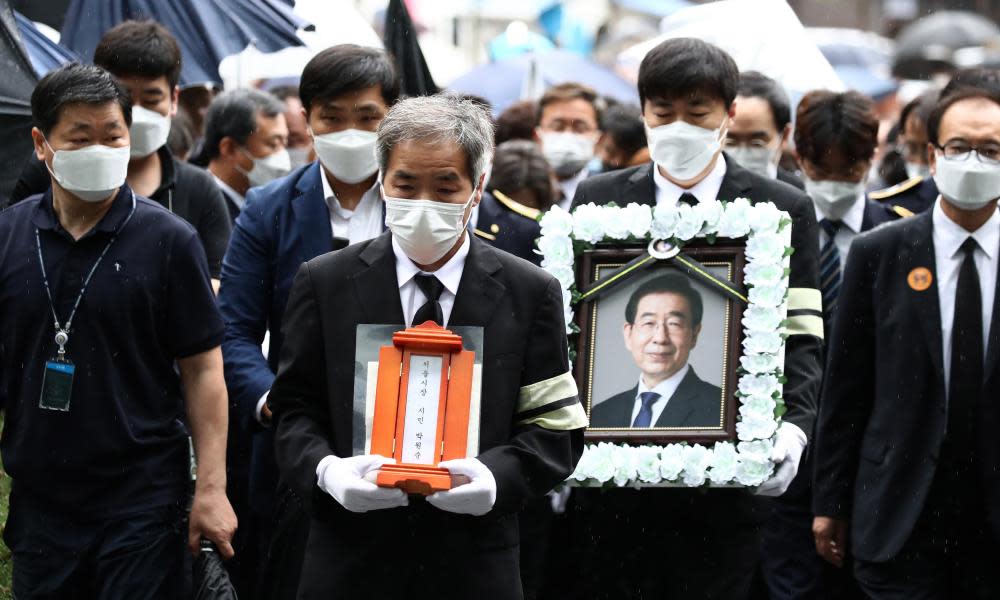Seoul mayor funeral: anger at use of public funds for five-day service

A row has broken out over whether the mayor of Seoul, who was found dead last week in an apparent suicide, should have been given a publicly funded funeral amid allegations he sexually harassed a member of his staff.
The South Korean capital’s administrative court dismissed an 11th-hour injunction to block the use of taxpayer funds for the funeral on Monday morning of Park Won-soon, whose body was found in mountain woods in Seoul on Friday.
While many South Koreans voiced shock at Park’s death, more than 500,000 people signed a petition calling on the country’s presidential Blue House not to use public money for the service. “Holding a quiet, family funeral would be the proper thing to do,” the petition said.
Park’s former secretary filed a police complaint against him on Wednesday. His death means the investigation into the case will automatically be closed.
A lawyer for the woman told reporters on Monday that her client had suffered multiple acts of sexual harassment from Park, including obscene late-night text messages and underwear selfies, during the four years she worked for him.
He would call her to his bedroom next to his office and ask her to “hug him” and on one occasion put his lips to her bruised knee “to kiss it better”, the lawyer said.
“I should have screamed, cried out loud and reported it at the very first time,” the victim, who has maintained her anonymity, said in a statement.
The funeral service was streamed online on Monday morning due to Covid-19 fears. About 100 members of Park’s family, along with friends, city officials and politicians attended the service at Seoul city hall.
Despite the controversy over his death, the Seoul city government organised a five-day funeral for Park – two days longer than the normal Korean ritual, which begins on the day of death– and set up a memorial altar outside city hall.
More than 20,000 people paid their respects during the mourning period, with Park’s daughter telling mourners on Monday: “I could feel my father’s joy as I met the citizens one by one.”
He will be cremated at a memorial park in southern Seoul and laid to rest at his home town of Changnyeong, South Gyeongsang province.
Related: Death of Seoul mayor after harassment allegation shocks South Korea
As the representative of Seoul’s 10 million residents, Park – a member of the centre-left governing Democratic party of President Moon Jae-in – was considered the second most powerful politician in the country.
The 64-year-old former human rights lawyer championed liberal causes, including gender equality, and provided affordable housing for single working women during his decade in office.
He was widely considered a leading liberal candidate for president when Moon’s single five-year term ends in 2022, but his legacy risks being tainted by the allegations against him.
Opposition politicians had joined calls for Park to be cremated at a quiet family ceremony, saying the state-funded rites, which ended on Monday, was inappropriate in light of the allegations.
Ahn Cheol-soo, the head of the People’s party, wrote of his sadness on hearing of Park’s death but added that he had decided not to personally offer his condolences. Instead of paying for Park’s funeral, the city government should examine the behaviour of senior public servants, Ahn wrote on his Facebook page.
Two female lawmakers with the progressive Justice party – Ryu Ho-jeong and Jang Hye-yeong – voiced support for the woman who made the allegations, adding that they would not be paying their respects to Park, according to the Yonhap news agency.
Although police have yet to give a cause of death, Park reportedly left a note in his office that said: “I’m sorry to everyone. I thank everyone who has been with me in my life. I’m sorry to my family, to whom I have only caused pain.”
The circumstances surrounding Park’s death are expected to fuel further debate about the treatment of women in South Korea.
Park is one of several senior politicians to face accusations of sexual misconduct in South Korea, a male-dominated society that became the centre of Asia’s #MeToo movement in 2018.
Ahn Hee-jung, the liberal former governor of South Chungcheong province, is serving a prison sentence for raping his former secretary. Earlier this year, Oh Keo-don, the former mayor of Busan, the country’s second-largest city, resigned after a female public servant accused him of sexually harassing her in his office.
“Almost all South Korean men, whether they are politically conservative or liberal, are very traditional and patriarchal when it comes to gender issues,” Lee Soo-yeon, a researcher at the Korean Women’s Development Institute in Seoul, told Agence France-Presse. “Politicians – who constantly seek power and acknowledgement – are no exception.”
In the UK and Ireland, Samaritans can be contacted on 116 123 or email jo@samaritans.org or jo@samaritans.ie. In the US, the National Suicide Prevention Lifeline is 1-800-273-8255. In Australia, the crisis support service Lifeline is 13 11 14. Other international helplines can be found at www.befrienders.org.


